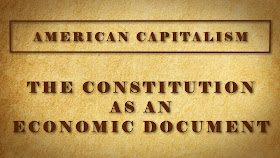An Economic
Interpretation of the Constitution of the United States by Charles A. Beard, 1913, Edited Excerpts
The
primary objective of government is making rules which determine the property
relations of members of society. The law is concerned with the property
relations of men and the processes by which the ownership of property passes
from one person to another. Different degrees and kinds of property inevitably
exist in modern society; class and group divisions based on property lie at the
basis of modern government; and politics and constitutional law is inevitably a
reflex of these contending interests.
The
concept of the Constitution as a piece of abstract legislation reflecting no
group interests and recognizing no economic antagonisms is entirely false. It
was an economic document drawn with superb skill by men whose property
interests were immediately at stake. Nationalism was created by a wielding of
economic interests that cut through state boundaries. The southern planter was
as much concerned in maintaining order against slave revolts as the creditor in
putting down desperate debtors.
The
Constitution is essentially an economic document based upon the concept that
the fundamental rights of property are anterior to government and morally
beyond the reach of popular majorities. The Constitution was the work of a
consolidated group whose interests knew no state boundaries and were truly
national in their scope. The members of the Philadelphia Convention which
drafted the Constitution were immediately, directly, and personally interested
in, and derived economic advantages from, the establishment of the new system.
The
opposition to the Constitution almost uniformly came from non-slaveholding
farmers and from debtors. No popular
vote was taken directly or indirectly on the proposition to call the Convention
which drafted the Constitution. A large property-less mass was, under
prevailing suffrage qualifications, excluded at the outset from participation
in the work of framing the Constitution. It is pretty conclusive that the
Constitution was not the product of “we the people,” but of a group of economic
interests which expected beneficial results from its adoption.
Bush's State of the Union
Address January 2008
The strength -- the secret of our strength, the
miracle of America, is that our greatness lies not in our government, but in
the spirit and determination of our people. (Applause.) When the Federal
Convention met in Philadelphia in 1787, our nation was bound by the Articles of
Confederation, which began with the words, "We the undersigned
delegates." When Gouverneur Morris was asked to draft a preamble to our
new Constitution, he offered an important revision and opened with words that
changed the course of our nation and the history of the world: "We the
people."

